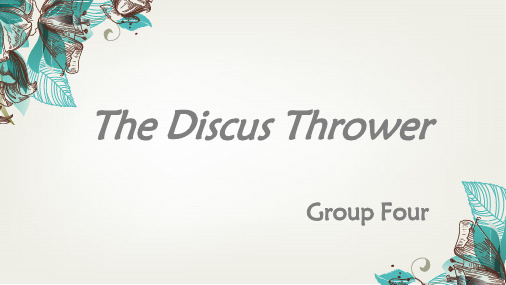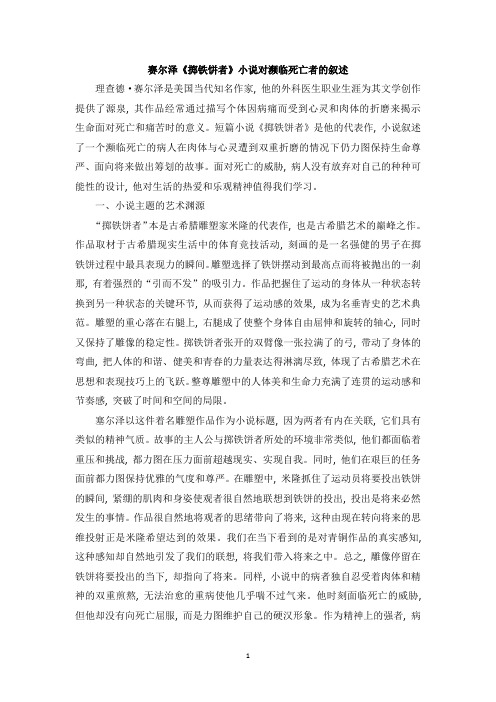the Discus Thrower 掷铁饼者
- 格式:ppt
- 大小:92.00 KB
- 文档页数:10

精读(第四册)第九单元TheDiscusThrower词汇讲解11S.4.9 Text 1, Unit 9The Discus ThrowerRichard Selzer Vocabulary1. discus (n.) a heavy plate-shaped object which is thrown as part of a sports event.例句:He won the discus at the Montreal Olympics.形近词:discuss, disuse, disgust, disco2. stance (n.) a way of thinking about something, especially expressed in a publicly stated opinion:例句:The doctor's stance on the issue of abortion is well known.同义词:attitude, viewpoint, opinion, standpoint, angle.形近词:staunch, stand, stanza3. assemble (v.) to come together in a single place or bring parts together in a single group.同根词:assemblyman, assembly, assembler, assemblage同义词:gather, collect, meet, muster, rally, congregate, convene反义词:disperse形近词:resemble△ 4. furtive(adj.) behaving secretly so that other people do not notice them, or (of actions) done secretly and often quickly so that people do not notice.例句:There was something furtive about his behaviour and I immediately felt suspicious.同根词:furtively, furtiveness同义词:secretive, stealthy, secret, sly, sneaky, cautious反义词:open, above abroad形近词:fugitive, futile, fertile.5. tan (v.) if a person or their skin tans or is tanned, they become brown as a result of spending time in the sun.例句:Her skin tans very quickly in the summer.同根词:tannish△6. vile (adj.) unpleasant, immoral and unacceptable例句:This vile policy of ethnic cleansing must be stopped. 必须停止这种卑鄙的种族清洗政策。



掷铁饼者雕塑赏析第一篇:掷铁饼者雕塑赏析《掷铁饼者》赏析《掷铁饼者》是公元前5世纪到公元前4世纪古希腊杰出的雕塑家米隆的代表作。
大理石雕复制品,高约152 厘米,罗马国立博物馆、梵蒂冈博物馆、特尔梅博物馆均有收藏,原作为青铜,米隆作于约公元前450 年,现在已经遗失。
《掷铁饼者》这件作品表现的是投掷铁饼的运动员。
在运动过程中作者米隆选择了一个转折性的瞬间:运动员为投掷而大幅摆动双臂、快速旋转身躯。
他的身体运动已达到极限,在下一个瞬间他就要掷出铁饼。
作者抓住的这个瞬间概括了掷铁饼这一动作的整个过程,显示了运动员最典型的姿态。
最强烈地展示了运动员肌肉的健美和力量。
这个掷铁饼人的双臂张开,仿佛一张拉满的弓,加强了观众对于铁饼就要被飞速掷出的联想;铁饼和运动员头部的两个圆形左右呼应,支撑身体的右腿如同轴心,使大幅弓起的身体保持平衡。
这样的构思设计显示了米隆的艺术匠心。
这是一个非常难处理的动作。
作者能在构思和塑造上达到如此完美的程度,显示了他对于人体结构知识的极度熟悉和高超的雕塑技巧。
同时我们也可以知道,作者所在的那个时代的艺术风格是怎么样的:那是追求一种健美、庄重、和谐,洋溢着青春活力的美。
米隆生于公元前492年,公元前5世纪到公元前4世纪古希腊杰出的雕塑家,艺术活动主要于公元前472年到440年间。
米隆大概在20岁时到阿基列达斯门下学习,而艺术成熟于40岁左右。
他擅长以青铜为材料的雕塑,能巧妙而准确地表现人物在运动中的正确姿态,塑成形神俱真的动物。
传说他为雅典城堡塑造的青铜牡牛雕像,由于乱真而招惹成群的野狼;他雕刻的马,竟引起真马的嘶叫。
可惜的是米隆所有的雕刻原作都没有保存下来,现在所看到的仅仅是后来罗马匠师模制的大理石复制品。
他的主要活动时期在公元前5世纪中叶。
米隆的突出贡献在于他使希腊雕塑最终摆脱古拙的样式而确立古典风范。
《掷铁饼者》充分体现的米隆的艺术风格,同时也体现古希腊时期的雕塑艺术风格。
米隆的《掷铁饼者》是古希腊中较早表现男性形象的作品。


赛尔泽《掷铁饼者》小说对濒临死亡者的叙述理查德·赛尔泽是美国当代知名作家, 他的外科医生职业生涯为其文学创作提供了源泉, 其作品经常通过描写个体因病痛而受到心灵和肉体的折磨来揭示生命面对死亡和痛苦时的意义。
短篇小说《掷铁饼者》是他的代表作, 小说叙述了一个濒临死亡的病人在肉体与心灵遭到双重折磨的情况下仍力图保持生命尊严、面向将来做出筹划的故事。
面对死亡的威胁, 病人没有放弃对自己的种种可能性的设计, 他对生活的热爱和乐观精神值得我们学习。
一、小说主题的艺术渊源“掷铁饼者”本是古希腊雕塑家米隆的代表作, 也是古希腊艺术的巅峰之作。
作品取材于古希腊现实生活中的体育竞技活动, 刻画的是一名强健的男子在掷铁饼过程中最具表现力的瞬间。
雕塑选择了铁饼摆动到最高点而将被抛出的一刹那, 有着强烈的“引而不发”的吸引力。
作品把握住了运动的身体从一种状态转换到另一种状态的关键环节, 从而获得了运动感的效果, 成为名垂青史的艺术典范。
雕塑的重心落在右腿上, 右腿成了使整个身体自由屈伸和旋转的轴心, 同时又保持了雕像的稳定性。
掷铁饼者张开的双臂像一张拉满了的弓, 带动了身体的弯曲, 把人体的和谐、健美和青春的力量表达得淋漓尽致, 体现了古希腊艺术在思想和表现技巧上的飞跃。
整尊雕塑中的人体美和生命力充满了连贯的运动感和节奏感, 突破了时间和空间的局限。
塞尔泽以这件着名雕塑作品作为小说标题, 因为两者有内在关联, 它们具有类似的精神气质。
故事的主人公与掷铁饼者所处的环境非常类似, 他们都面临着重压和挑战, 都力图在压力面前超越现实、实现自我。
同时, 他们在艰巨的任务面前都力图保持优雅的气度和尊严。
在雕塑中, 米隆抓住了运动员将要投出铁饼的瞬间, 紧绷的肌肉和身姿使观者很自然地联想到铁饼的投出, 投出是将来必然发生的事情。
作品很自然地将观者的思绪带向了将来, 这种由现在转向将来的思维投射正是米隆希望达到的效果。
我们在当下看到的是对青铜作品的真实感知, 这种感知却自然地引发了我们的联想, 将我们带入将来之中。
Unit--The-Discus-Thrower课文翻译综合教程四————————————————————————————————作者:————————————————————————————————日期:Unit 8The Discus ThrowerRichard Selzer1 I spy on my patients. Ought not a doctor to observe his patients by any meansand from any stance that he might take for the more fully assemble evidence? So I stand in the doorways of hospital rooms and gaze. Oh, it is not all that furtive an act.Those in bed need only look up to discover me. But they never do.2 From the doorway of Room 542 the man in the bed seems deeply tanned. Blueeyes and close-cropped white hair give him the appearance of vigor and good health.But I know that his skin is not brown from the sun. It is rusted, rather, in the last stage of containing the vile repose within. And the blue eyes are frosted, looking inward like the windows of a snowbound cottage. This man is blind. This man is also legless ― the right leg missing from midthigh down, the left from just below the knee.It gives him the look of a bonsai, roots and branches pruned into the dwarfed facsimile of a great tree.3 Propped on pillows, he cups his right thigh in both hands. Now and then heshakes his head as though acknowledging the intensity of his suffering. In all of this he makes no sound. Is he mute as well as blind?4 The room in which he dwells is empty of all possessions ― no get-well cards,small, private caches of food, day-old flowers, slippers, all the usual kickshaws of the sick room. There is only the bed, a chair, a nightstand, and a tray on wheels that can be swung across his lap for meals.5 “What time is it?” he asks.“Three o’clock.”“Morning or afternoon?”“Afternoon.”He is silent. There is nothing else he wants to know.“How are you?” I say.“Who are you?” he asks.“It’s the doctor. How do you feel?”He does not answer right away.“Feel?” he says.“I hope you feel better,” I say.I press the button at the side of the bed.“Down you go,” I say.“Yes, down,” he says.6 He falls back upon the bed awkwardly. His stumps, unweighted by legs and feet,rise in the air, presenting themselves. I unwrap the bandages from the stumps, and begin to cut away the black scabs and the dead, glazed fat with scissors and forceps.A shard of white bone comes loose. I pick it away. I wash the wounds withdisinfectant and redress the stumps. All this while, he does not speak. What is he thinking behind those lids that do not blink? Is he remembering a time when he was whole? Does he dream of feet? Or when his body was not a rotting log?7 He lies solid and inert. In spite of everything, he remains impressive, as thoughhe were a sailor standing athwart a slanting deck.“Anything more I can do for you?” I ask.For a long moment he is silent.“Yes,” he says at last and without the least irony. “You can bring me a pair of shoes.”In the corridor, the head nurse is waiting for me.“We have to do something about him,” she says. “Every morning he orders scrambled eggs for breakfast, and, instead of eating them, he picks up theplate and throws it against the wall.”“Throws his plate?”“Nasty. That’s what he is. No wonder his family doesn’t come to visit. They probably can’t stand him any more than we can.”She is waiting for me to do something.“Well?”“We’ll see,” I say.8 The next morning I am waiting in the corridor when the kitchen delivers hisbreakfast. I watch the aide place the tray on the stand and swing it across his lap. She presses the button to raise the head of the bed. Then she leaves.9 In time the man reaches to find the rim of the tray, then on to find the dome ofthe covered dish. He lifts off the cover and places it on the stand. He fingers across the plate until he probes the eggs. He lifts the plate in both hands, sets it on the palm of his right hand, centers it, balances it. He hefts it up and down slightly, getting the feel on it. Abruptly, he draws back his right arm as far as he can.10 There is the crack of the plate breaking against the wall at the foot of his bed andthe small wet sound of the scrambled eggs dropping to the floor.11 And then he laughs. It is a sound you have never heard. It is something newunder the sun. It could cure cancer.Out in the corridor, the eyes of the head nurse narrow.“Laughed, did he?”She writes something down on her clipboard.12 A second aide arrives, brings a second breakfast tray, puts it on the nightstand,out of his reach. She looks over at me shaking her head and making her mouth go. I see that we are to be accomplices.13 “I’ve got to feed you,” she says to the man.“Oh, no, you don’t,” the man says.“Oh, yes, I do,” the aide says, “after the way you just did. Nurse says so.”“Get me my shoes,” the man says.“Here’s the oatmeal,” the aide says. “Open.” And she t ouches the spoon to his lower lip.“I ordered scrambled eggs,” says the man.“That’s right,” the aide says.I step forward.“Is there anything I can do?” I say.“Who are you?” the man asks.14 In the evening I go once more to that ward to make my rounds. The head nursereports to me that Room 542 is deceased. She has discovered this by accident, she says. No, there had been no sound. Nothing. It’s a blessing, she says.15 I go into his room, a spy looking for secrets. He is still there in his bed. His faceis relaxed, grave, dignified. After a while, I turn to leave. My gaze sweeps the wall at the foot of the bed, and I see the place where it has been repeatedly washed, where the wall looks very clean and white.掷铁饼者理查德·塞尔泽1 我窥探我的病人。
the discus t hrower课文概述《The Discus Thrower》是一篇关于田径项目铁饼投掷的课文。
本文通过描写一名年轻的铁饼投掷运动员与他的教练的对话,展示了运动员在训练中遇到的困难和挑战,以及对于坚持和努力的探讨。
从中,我们可以获得一些关于如何克服困难、如何取得成就和如何保持积极心态的启示。
文中的女教练提到了运动员需要克服的困难,比如他感到力量不够,不能投得很远。
这个问题引出了一个更大的主题 - 如何克服挑战。
教练告诉运动员,只有通过持续的努力和训练,才能克服困难,并取得真正的进步。
这种思想对于任何追求成就的人都是重要的,因为困难和挑战是不可避免的,但坚持和努力是取得成功的关键。
教练还强调了持续训练的重要性。
运动员有时可能会感到厌倦,想要放弃。
但教练告诉他,只有坚持下来,每天训练,才能实现自己的目标。
这个观点适用于大部分领域,无论是体育,学术或者职业,都需要持续的付出和训练才能取得进步。
在对话中,教练还提到了自信的重要性。
她告诉运动员,他需要相信自己,相信自己可以投得很远。
自信是成功的关键要素,它可以激励一个人克服困难和取得成功。
当然,自信不是一蹴而就的,它需要通过努力和成功来培养。
此外,文中还提到了运动员需要建立预设目标,并逐步实现这些目标。
教练鼓励运动员制定一系列可行的小目标,逐一实现,逐渐走向完美。
这种方法在达到大目标时非常有用,因为它可以帮助人们保持动力和专注,同时也减轻了目标过于庞大带来的压力。
通过本文,我们可以得出一些启示。
首先,克服困难和挑战需要持续的坚持和努力。
只有通过不断练习和训练,才能取得进步。
其次,自信是成功的关键,它可以激励人们克服困难和实现目标。
第三,明确的目标和逐步实现的计划对于成功起到了关键作用。
总之,《The Discus Thrower》这篇课文通过对话的形式,向读者展示了铁饼投掷运动员在训练中所面临的困难和挑战。
通过教练的指导和运动员的努力,我们看到了如何克服困难,取得进步,并最终达到自己的目标。
Unit 8The Discus ThrowerRichard Selzer1 I spy on my patients. Ought not a doctor to observe his patients by any meansand from any stance that he might take for the more fully assemble evidence? So I stand in the doorways of hospital rooms and gaze. Oh, it is not all that furtive an act.Those in bed need only look up to discover me. But they never do.2 From the doorway of Room 542 the man in the bed seems deeply tanned. Blueeyes and close-cropped white hair give him the appearance of vigor and good health.But I know that his skin is not brown from the sun. It is rusted, rather, in the last stage of containing the vile repose within. And the blue eyes are frosted, looking inward like the windows of a snowbound cottage. This man is blind. This man is also legless ― the right leg missing from midthigh down, the left from just below the knee.It gives him the look of a bonsai, roots and branches pruned into the dwarfed facsimile of a great tree.3 Propped on pillows, he cups his right thigh in both hands. Now and then heshakes his head as though acknowledging the intensity of his suffering. In all of this he makes no sound. Is he mute as well as blind?4 The room in which he dwells is empty of all possessions ― no get-well cards,small, private caches of food, day-old flowers, slippers, all the usual kickshaws of the sick room. There is only the bed, a chair, a nightstand, and a tray on wheels that can be swung across his lap for meals.5 “What time is it?” he asks.“Three o’clock.”“Morning or afternoon?”“Afternoon.”He is silent. There is nothing else he wants to know.“How are you?” I say.“Who are you?” he asks.“It’s the doctor. How do you feel?”He does not answer right away.“Feel?” he says.“I hope you feel better,” I say.I press the button at the side of the bed.“Down you go,” I say.“Yes, down,” he says.6 He falls back upon the bed awkwardly. His stumps, unweighted by legs and feet,rise in the air, presenting themselves. I unwrap the bandages from the stumps, and begin to cut away the black scabs and the dead, glazed fat with scissors and forceps.A shard of white bone comes loose. I pick it away. I wash the wounds withdisinfectant and redress the stumps. All this while, he does not speak. What is he thinking behind those lids that do not blink? Is he remembering a time when he was whole? Does he dream of feet? Or when his body was not a rotting log?7 He lies solid and inert. In spite of everything, he remains impressive, as thoughhe were a sailor standing athwart a slanting deck.“Anything more I can do for you?” I ask.For a long moment he is silent.“Yes,” he says at last and without the least irony. “You can bring me a pair of shoes.”In the corridor, the head nurse is waiting for me.“We have to do something about him,” she says. “Every morning he orders scrambled eggs for breakfast, and, instead of eating them, he picks up the plate and throws it against the wall.”“Throws his plate?”“Nasty. That’s what he is. No wonder his family doesn’t come to visit. They probably can’t stand him any more than we can.”She is waiting for me to do something.“Well?”“We’ll see,” I say.8 The next morning I am waiting in the corridor when the kitchen delivers hisbreakfast. I watch the aide place the tray on the stand and swing it across his lap. She presses the button to raise the head of the bed. Then she leaves.9 In time the man reaches to find the rim of the tray, then on to find the dome ofthe covered dish. He lifts off the cover and places it on the stand. He fingers across the plate until he probes the eggs. He lifts the plate in both hands, sets it on the palm of his right hand, centers it, balances it. He hefts it up and down slightly, getting the feel on it. Abruptly, he draws back his right arm as far as he can.10 There is the crack of the plate breaking against the wall at the foot of his bed andthe small wet sound of the scrambled eggs dropping to the floor.11 And then he laughs. It is a sound you have never heard. It is something newunder the sun. It could cure cancer.Out in the corridor, the eyes of the head nurse narrow.“Laughed, did he?”She writes something down on her clipboard.12 A second aide arrives, brings a second breakfast tray, puts it on the nightstand,out of his reach. She looks over at me shaking her head and making her mouth go. I see that we are to be accomplices.13 “I’ve got to feed you,” she says to the man.“Oh, no, you don’t,” the man says.“Oh, yes, I do,” the aide says, “after the way you just did. Nurse says so.”“Get me my shoes,” the man says.“Here’s the oatmeal,” the aide says. “Open.” And she touches the spoon to his lower lip.“I ordered scrambled eggs,” says the man.“That’s right,” the aide says.I step forward.“Is there anything I can do?” I say.“Who are you?” the man asks.14 In the evening I go once more to that ward to make my rounds. The head nursereports to me that Room 542 is deceased. She has discovered this by accident, she says. No, there had been no sound. Nothing. It’s a bl essing, she says.15 I go into his room, a spy looking for secrets. He is still there in his bed. His faceis relaxed, grave, dignified. After a while, I turn to leave. My gaze sweeps the wall at the foot of the bed, and I see the place where it has been repeatedly washed, where the wall looks very clean and white.掷铁饼者理查德·塞尔泽1 我窥探我的病人。